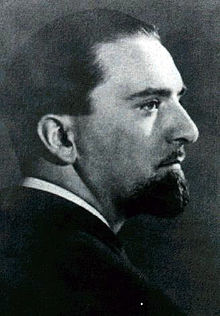Dino Grandi
|
Count Dino Grandi |
|
|---|---|
 |
|
| Italian Minister of Foreign Affairs | |
|
In office 12 September 1929 – 20 July 1932 |
|
| Prime Minister | Benito Mussolini |
| Preceded by | Benito Mussolini interim |
| Succeeded by | Benito Mussolini interim |
| President of Chamber of Fasci and Corporations | |
|
In office 30 November 1939 – 2 August 1943 |
|
| Preceded by | Giacomo Acerbo |
| Succeeded by | Vittorio Emanuele Orlando |
| Personal details | |
| Born | 4 June 1895 Mordano, Italy |
| Died | 21 May 1988 (aged 92) Bologna, Italy |
| Nationality | Italian |
| Political party | National Fascist Party |
| Alma mater | University of Bologna |
| Profession |
Lawyer Politician |
| Religion | Roman Catholicism |
Dino Grandi (4 June 1895 – 21 May 1988), 1st Conte di Mordano, was an Italian Fascist politician, minister of justice, minister of foreign affairs and president of parliament.
Born at Mordano, province of Bologna, Grandi was a graduate in law and economics at the University of Bologna in 1919 (after serving in World War I). Grandi started a career as a lawyer in Imola. Attracted to the political left, he nonetheless became impressed with Benito Mussolini after the two met in 1914, and became a staunch advocate of Italy's entry into the World War.
He joined the Blackshirts at age 25, and was one of 35 Fascist delegates elected, along with Mussolini, in May 1921 to the Chamber of Deputies. Grandi survived an ambush carried out by leftist militants in 1920, and had his studio devastated on one occasion.
After the March on Rome on 28 October 1922, in which the Fascists took power in Italy, Grandi became part of the new government; first as the undersecretary of the interior (1923), then as the Italian Minister of Foreign Affairs (1929) and then as Italy's ambassador to the United Kingdom (1932 to 1939). Grandi was an ally to the most radical and violent groups of fascists, always surrounding himself with members of the Blackshirts. He used his power base to voice criticism of Mussolini's attempt to reach an armistice with left-wingers and was at one point under suspicion for having attempted to replace the latter with the skeptical alleged Mussolini forerunner Gabriele D'Annunzio.
...
Wikipedia
